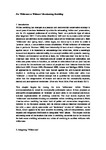For Wilderness or Wildness? Decolonising Rewilding
| dc.contributor.author | Ward, Kimberley | |
| dc.date.accessioned | 2019-04-12T12:00:40Z | |
| dc.date.issued | 2019-02 | |
| dc.identifier.isbn | 9781108560962 | |
| dc.identifier.other | 3 | |
| dc.identifier.uri | http://hdl.handle.net/10026.1/13705 | |
| dc.description.abstract |
Whilst rewilding has emerged as a popular and controversial conservation strategy in recent years it has been lambasted by critics for advocating ‘wilderness’ preservation, and for it’s supposed preference of re-wilding ‘back’ to a particular type of nature (See Jørgensen 2015:12 who states [Rewilders] ‘still want to re-create a wild without people and are oblivious to the problematic nature of the wilderness construct’). Both ‘wilderness’ and ‘going back’, critics argue, are bound-up in a drive to create a ‘pristine’ nature, a nature before human inhabitation. Whilst defenders of wilderness (see in particular Foreman 1998) have historically hit back at such critiques as a ‘war against nature’ it is important to acknowledge that wilderness, whilst a seemingly innocent and objective material reality, is a concept indelible with symbolic meaning. In Western environmental narratives at least, the ‘wilderness idea’ was led by EuroAmerican men within the historical-cultural context of patriarchal colonialism and wilderness preservation is therefore, an artefact of colonialism that can (and has) act as a vehicle for the exclusion and erasure of people and their histories from the land (Merchant 1980; Cronon 1996; Plumwood 1998; Adams and Mulligan 2003). Critics of approaches to rewilding then have warned against the anti-humanist sentiment implicit in rewilding narratives that appear to advocate ‘wilderness’ rather than ‘wildness’, a linked but distinct concept that is qualified by non-human autonomy rather than the categorisation of humans and nature into the conceptually separate, distinct and pure sphere of wilderness (Prior and Ward 2016; Prior and Brady 2017). This chapter begins by tracing the term ‘wilderness’ within Western environmentalism to reveal its conceptually problematic nature. It then proposes an alternative conceptualisation of ‘wildness’ as more useful in the practical and futureoriented implementation of rewilding initiatives. The final section explores how ‘wilderness’ and dualistic thinking are embedded within rewilding narratives in North America where rewilding has taken hold of public and conservation imaginations, however in the European context, with its distinct cultural-historical expressions of the wild, a more hybrid, open-ended and ‘borderland’ version of ‘wildness’ can be found, which appears to be more sensitive to existing cultural interpretations, social impacts and indigenous livelihoods in designated ‘wild’ places. The chapter ends by addressing some of the tensions that arise in rewilding narratives due to the tendency for both some rewilding advocates and critics of rewilding to conflate wildness with wilderness. | |
| dc.format.extent | 34-54 | |
| dc.language.iso | en | |
| dc.publisher | Cambridge University Press | |
| dc.relation.ispartof | Rewilding | |
| dc.title | For Wilderness or Wildness? Decolonising Rewilding | |
| dc.type | chapter | |
| plymouth.publication-status | Published | |
| dc.identifier.doi | 10.1017/9781108560962.003 | |
| plymouth.organisational-group | /Plymouth | |
| plymouth.organisational-group | /Plymouth/Faculty of Science and Engineering | |
| plymouth.organisational-group | /Plymouth/Faculty of Science and Engineering/School of Geography, Earth and Environmental Sciences | |
| plymouth.organisational-group | /Plymouth/REF 2021 Researchers by UoA | |
| plymouth.organisational-group | /Plymouth/REF 2021 Researchers by UoA/UoA14 Geography and Environmental Studies | |
| plymouth.organisational-group | /Plymouth/Research Groups | |
| plymouth.organisational-group | /Plymouth/Research Groups/Centre for Research in Environment and Society (CeRES) | |
| plymouth.organisational-group | /Plymouth/Research Groups/Centre for Research in Environment and Society (CeRES)/CeRES (Reporting) | |
| plymouth.organisational-group | /Plymouth/Users by role | |
| plymouth.organisational-group | /Plymouth/Users by role/Academics | |
| dc.rights.embargodate | 2019-8-1 | |
| dc.rights.embargoperiod | Not known | |
| rioxxterms.versionofrecord | 10.1017/9781108560962.003 | |
| rioxxterms.licenseref.uri | http://www.rioxx.net/licenses/all-rights-reserved | |
| rioxxterms.type | Book chapter |


